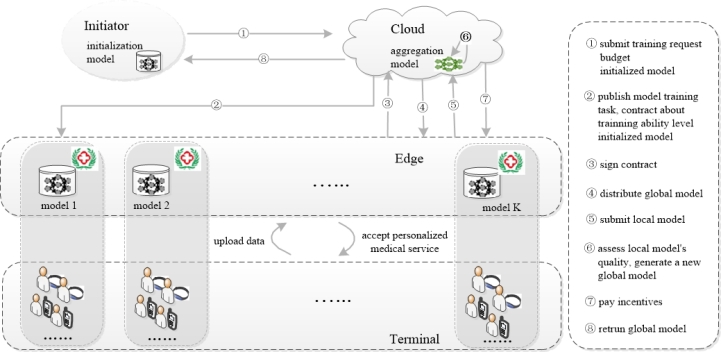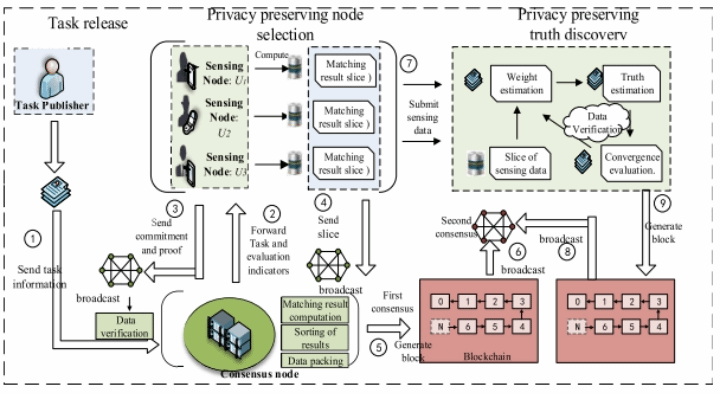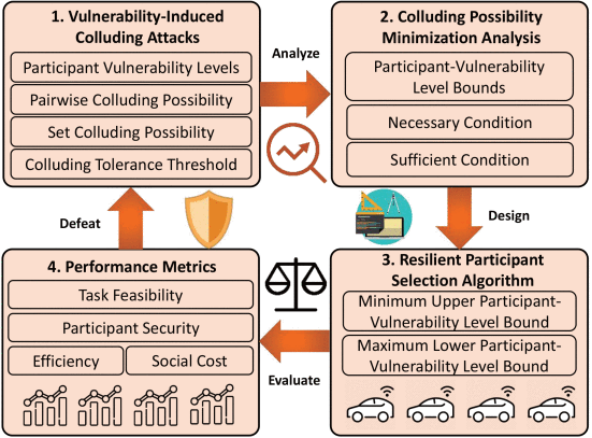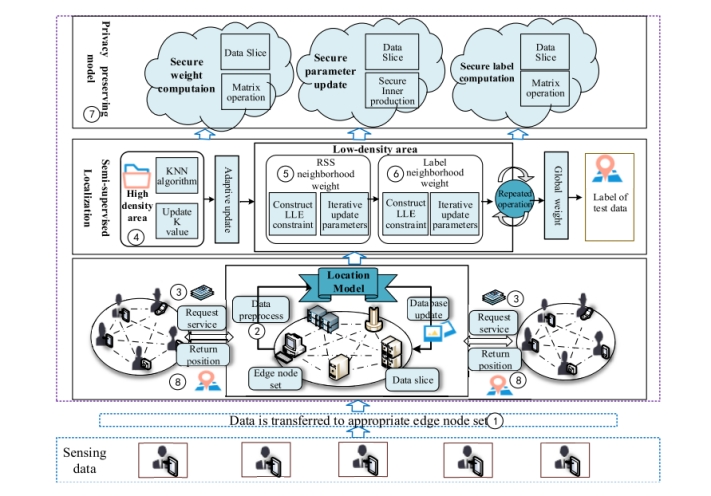Henan International Joint Laboratory of Intelligent Network Theory and Key Technology, School of Software, Henan University, focuses on the strategical research field of intelligent sensing network for emerging industries such as the Internet of Things, artificial intelligence, blockchain and cyberspace security. A series of problems has been investigated in intelligent sensing network, such as high cost of federated learning training, perceptive privacy information disclosure, perceptive node collusion attacks and insufficient indoor positioning accuracy. New intelligent sensing strategies, such as contract theory-based incentive mechanism, blockchain based privacy protection quality control mechanism, vulnerability-based collusion attack defense mechanism, and manifold regularization based high-precision indoor positioning method, are designed. Low cost, privacy protection, security protection and high-precision positioning services are provided for intelligent sensing networks.
Incentive Mechanism for Federated Learning in Crowdsensing
Federated Learning provides an effective solution for multi-party data processing under privacy-preserving, and becomes a good choice for crowd intelligence extraction in health crowdsensing. In order to motivate more data holders with large amounts of high-quality data and computing power to participate in Federated Learning. This article transforms the problem of motivating data holders into an optimization problem of utility from the perspective of maximizing the utility of the data holder, establishes the incentive mechanism based on the Contract Theory, and proves that the optimal strategy set of the data holders reaches Nash Equilibrium. A large number of experiments based on public datasets of UCI and MNIST verify that the incentive mechanism can make the baseline algorithm converge faster, while resisting malicious behaviors such as free-riding and collusive attacks.
This paper was published in IEEE Internet of Things Journal 2022 (IF=10.238, SCI Journal with Category Quartile 1), a top journal in the field of Internet of Things. Professor Xin He from School of Software, Henan University is the first corresponding author, and Henan University is the first affiliation.

Paper link:https://ieeexplore.ieee.org/document/9932890
Privacy-Preserving Quality Control Mechanism in Crowdsensing
Aiming at the problem that participants' information and data truth value are easily exposed during the implementation of data collection paradigm——mobile crowdsensing (MCS), this paper integrated the blockchain into the MCS scenario to design a blockchain based privacy-preserving quality control mechanism, which prevents data from being tampered with, and denied, ensuring that the reward is distributed fairly. Considering the issues with sensing data privacy and efficiency in the truth discovery process, a new privacy-aware crowdsensing design is proposed with iterative truth discovery based on rational secure multiparty computation. The experimental results show that the proposed solutions are highly practical and facilitate quality control without violating the participant's privacy.
This paper was published in IEEE/ACM Transactions on Networking, Vol. 30, No. 3, 2022, 1352-1367 (IF=3.796, CCF Class A journal). Dr. Jian An from Xi 'an Jiaotong University is the first author, and Professor Xin He from the School of Software, Henan University is the first corresponding author.

Paper link:https://doi.org/10.1109/TNET.2022.3141582
Colluding Attacks Defense Mechanism in Crowdsensing
Aiming at the problem of participant selection considering collusion attacks in crowdsensing, this paper proposes a practical method to resist collusive attacks. The method considers the malicious participants with different vulnerability levels collude with each other to perform attacks, which makes participant selection more challenging. According to the structural characteristics of the colluding attack model, the necessary and sufficient conditions of achieving the colluding possibility minimization of the selected participants are derived. A novel resilient participant selection algorithm is developed based on the necessary and sufficient conditions. It is analyzed that the proposed algorithm achieves the colluding possibility minimization to defeat the vulnerability-induced colluding attack. Extensive real-world trace-based simulations are conducted to demonstrate the effectiveness of the proposed algorithm and the correctness of the theoretical results.
This paper was published in IEEE Transactions on Vehicular Technology, Vol.71, No. 7, 2022, 7904-7918 (IF: 6.239, SCI Journal with Category Quartile 2). Dr. Guanghui Wang, a young teacher from School of Software, Henan University, is the first author of the paper. Professor Xin He is the first corresponding author, and Henan University is the first affiliation.

Paper link:https://doi.org/10.1109/TVT.2022.3171396
Privacy-Preserving Indoor Positioning Service in Crowdsensing
In order to solve the problems of user privacy disclosure and location accuracy in the construction of large-scale indoor positioning system in crowdsensing service, this paper provides an edge-crowdsourcing indoor localization architecture to improve storage, computing power and response speed. Then, based on manifold regularization, a semi-supervised indoor localization model is determined by an adaptive manner in terms of both similarity and manifold structure, which reduces the workload of the positioning model and improve localization accuracy. In addition, a new privacy-aware indoor localization algorithm is proposed based on secure multi-party computation to protect location privacy. Experimental results show that this scheme greatly improves the location accuracy and reduces the time cost of privacy protection.
The paper was published in IEEE Transactions on Network and Service Management, Vol. 18, No. 4, 2021, 4875-4887 (IF=4.758, SCI Journal with Category Quartile 2). Dr. Jian An from Xi 'an Jiaotong University is the first author, and Professor Xin He from the School of Software, Henan University, is the first corresponding author.

Paper link:https://doi.org/10.1109/TNSM.2021.3107718

 News /
Content
News /
Content


